2023年中考英语复习 第十节 谓语动词的时态课件(共94张PPT)
文档属性
| 名称 | 2023年中考英语复习 第十节 谓语动词的时态课件(共94张PPT) |  | |
| 格式 | pptx | ||
| 文件大小 | 1.1MB | ||
| 资源类型 | 教案 | ||
| 版本资源 | 人教新目标(Go for it)版 | ||
| 科目 | 英语 | ||
| 更新时间 | 2023-06-07 13:16:17 | ||
图片预览

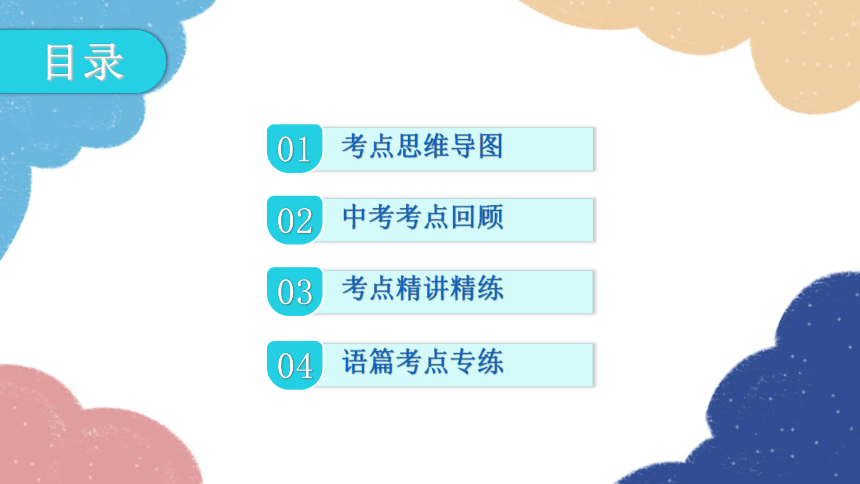

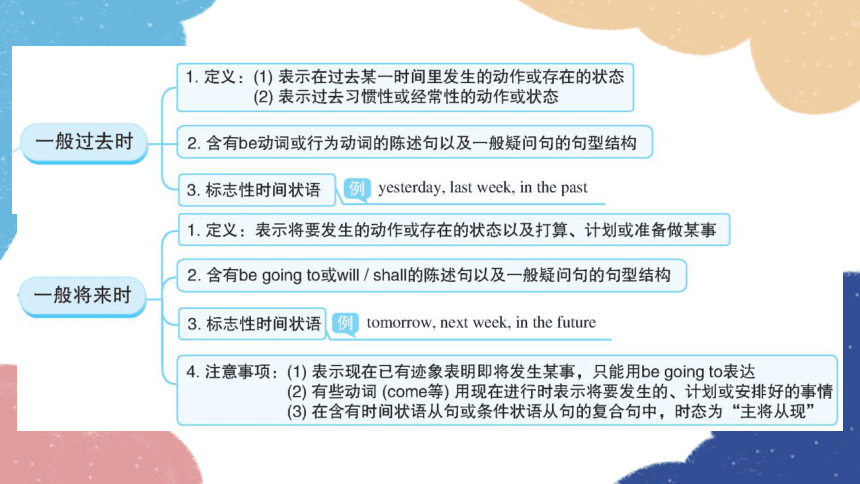
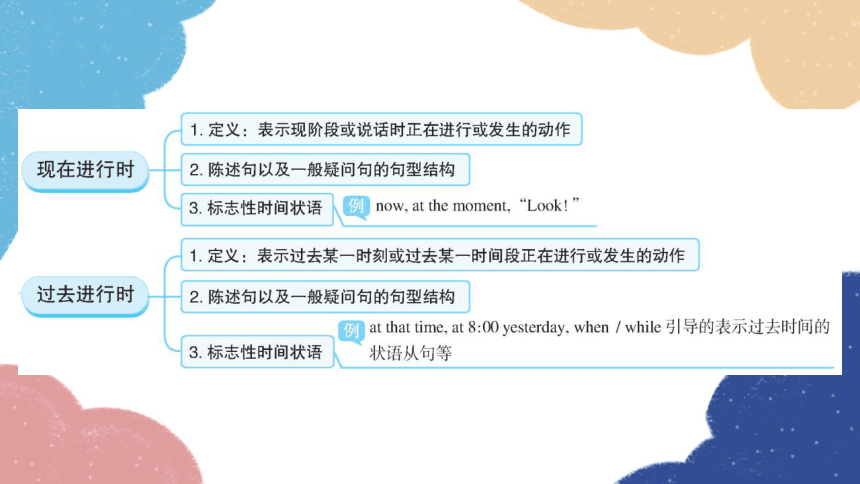
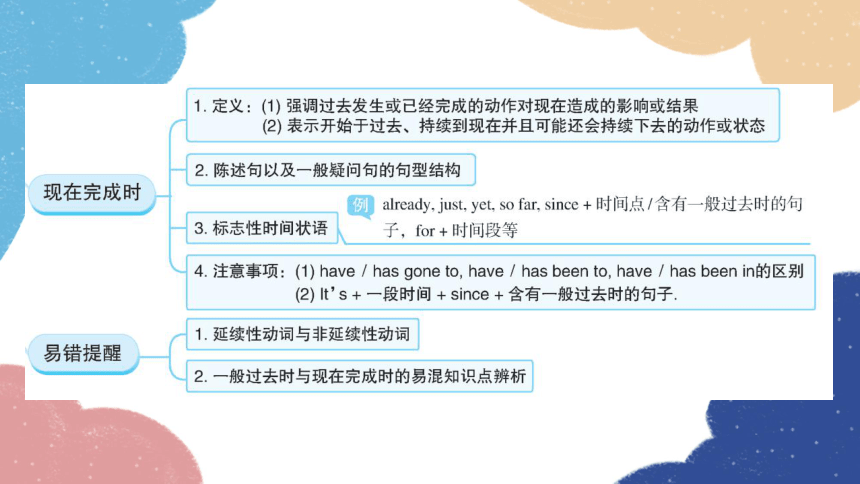
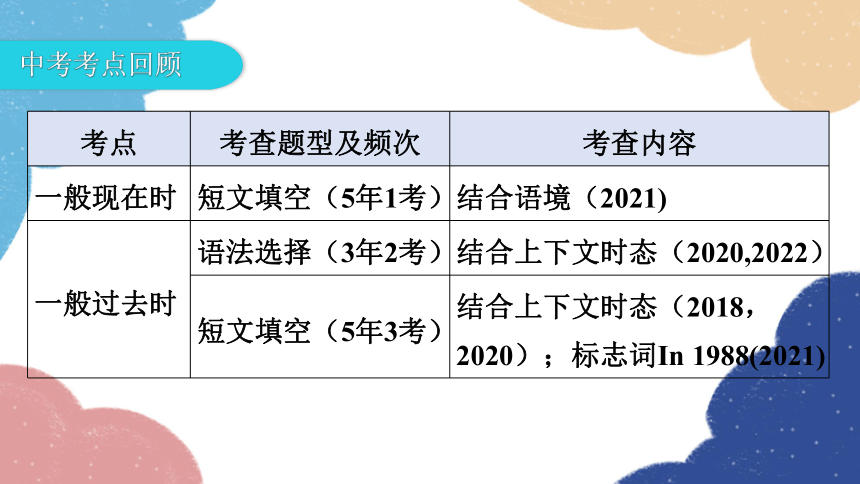
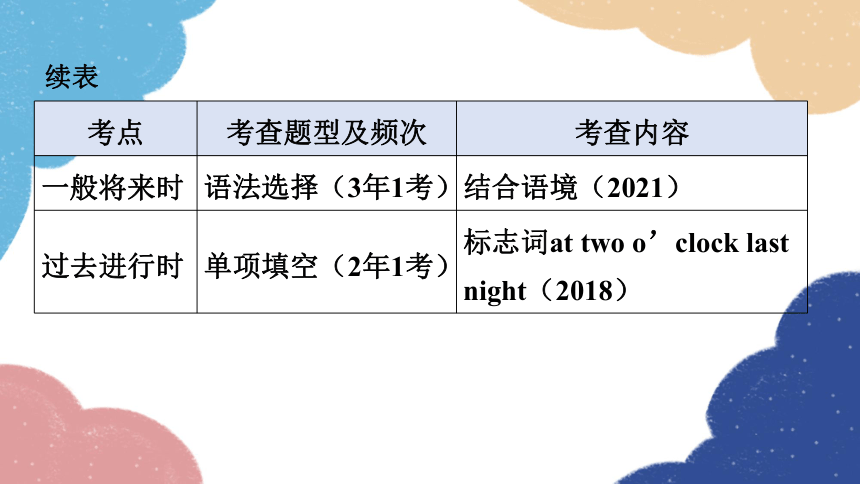
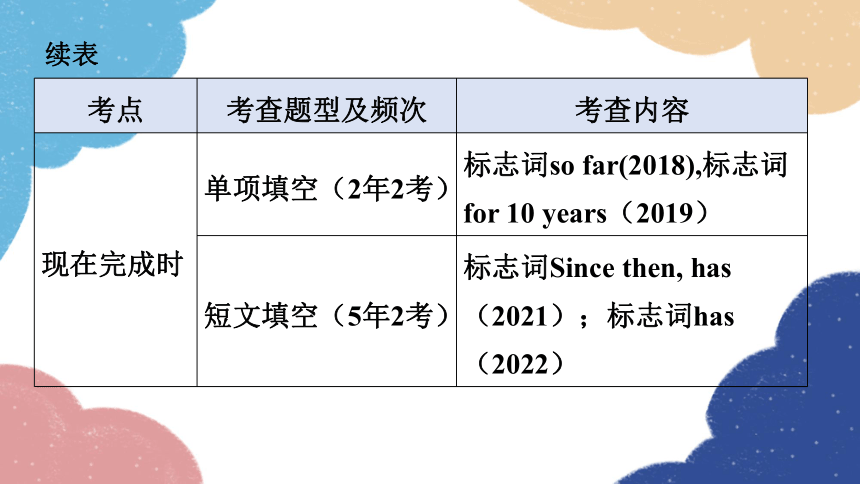
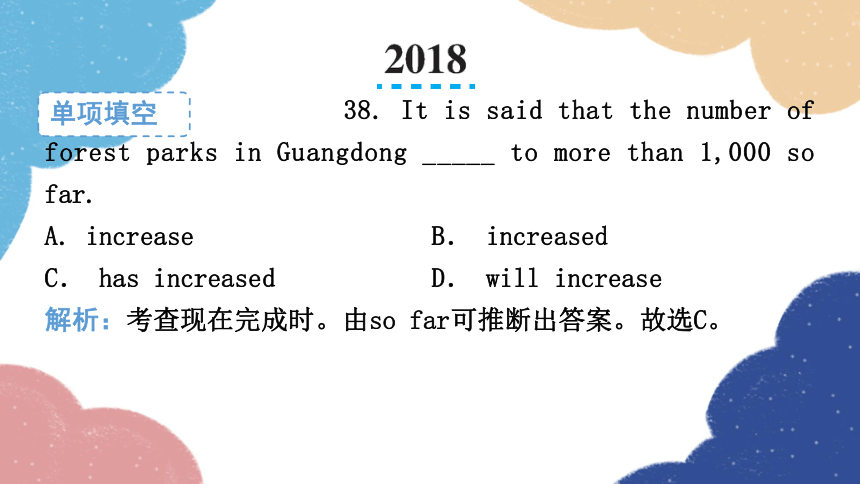
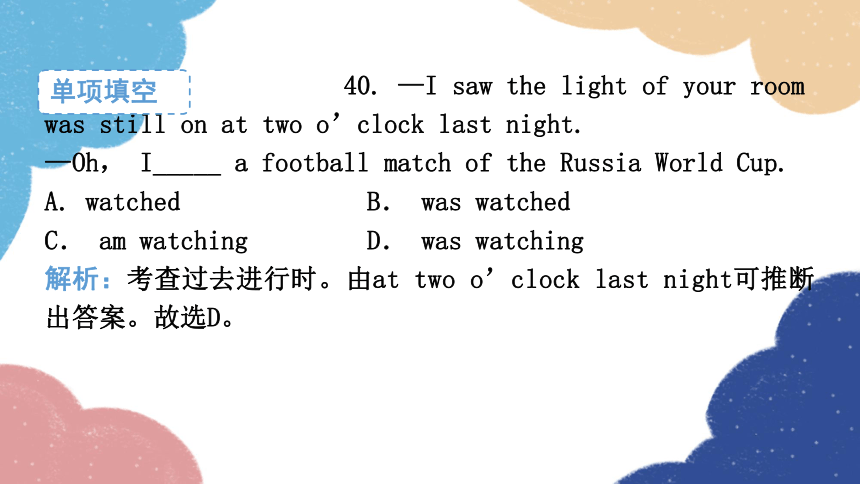
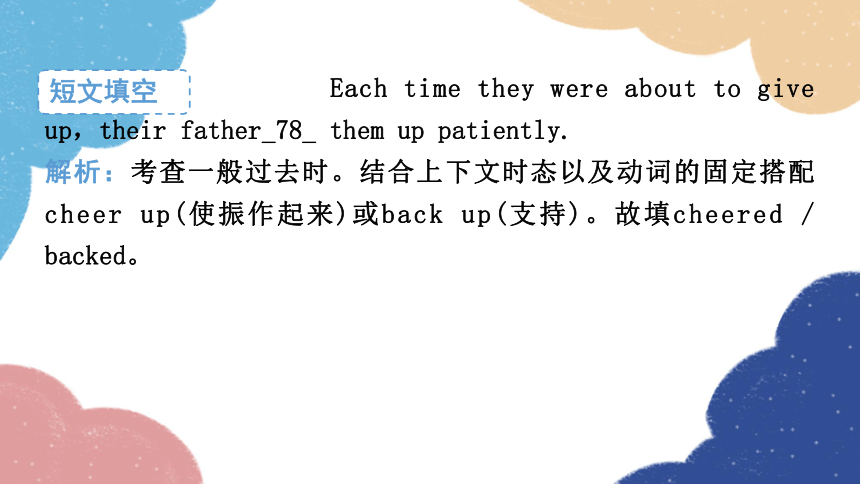
文档简介
(共94张PPT)
第一部分 基于语义的语法知识篇
句 法
第十节 谓语动词的时态
目录
考点思维导图
01
中考考点回顾
02
考点精讲精练
03
语篇考点专练
04
考点思维导图
中考考点回顾
考点 考查题型及频次 考查内容
一般现在时 短文填空(5年1考) 结合语境(2021)
一般过去时 语法选择(3年2考) 结合上下文时态(2020,2022)
短文填空(5年3考) 结合上下文时态(2018,2020);标志词In 1988(2021)
续表
考点 考查题型及频次 考查内容
一般将来时 语法选择(3年1考) 结合语境(2021)
过去进行时 单项填空(2年1考) 标志词at two o’clock last night(2018)
续表
考点 考查题型及频次 考查内容
现在完成时 单项填空(2年2考) 标志词so far(2018),标志词for 10 years(2019)
短文填空(5年2考) 标志词Since then, has(2021);标志词has(2022)
38. It is said that the number of forest parks in Guangdong _____ to more than 1,000 so far.
A. increase B. increased
C. has increased D. will increase
解析:考查现在完成时。由so far可推断出答案。故选C。
单项填空
40. —I saw the light of your room was still on at two o’clock last night.
—Oh, I_____ a football match of the Russia World Cup.
A. watched B. was watched
C. am watching D. was watching
解析:考查过去进行时。由at two o’clock last night可推断出答案。故选D。
单项填空
Each time they were about to give up,their father_78_ them up patiently.
解析:考查一般过去时。结合上下文时态以及动词的固定搭配cheer up(使振作起来)或back up(支持)。故填cheered / backed。
短文填空
41. My father _____ in a panda protection center for 10 years, so he knows a lot about pandas.
A. was working B. is working
C. has worked D. will work
解析:考查现在完成时。由for 10 years可推断出答案。故选C。
单项填空
Judie thought for a moment and _36_,“Butterflies. ”
A. answers B. answered
C. will answer D. has answered
解析:考查一般过去时。结合上下文时态可推断出答案。故选B。
语法选择
With the help of her mother, Jane _72_ up her first lemonade stand (摊档). In a week, it made $52.
解析:考查一般过去时。结合上下文时态以及动词的固定搭配set up / put up(建立)。故填set / put。
短文填空
Now, the city is hoping that the bridge _37_ lots of tourists to the area.
A. brought B. will bring
C. is bringing D. was bringing
解析:考查一般将来时。结合语境可推断出答案。故选B。
语法选择
His Chinese friends _68_ him “Lao Pan”.
解析:考查一般现在时。结合语境以及由后面的“Lao Pan”可知此处是“称呼”。故填call。
短文填空
In 1988, Lao Pan first came to China and _69_ as a teacher at a university.
解析:考查一般过去时。由In 1988可推断出用一般过去时。结合动词的固定搭配“work as+职业”(做……工作)。故填worked。
短文填空
Since then he has_71_ thirteen books about China.
解析:考查现在完成时。由Since then以及由空格前的has可推断出用现在完成时。结合动词的固定搭配write books(写书)或publish books(出版书)。故填written / published。
短文填空
She _39_ herself that she still had a long way to go and that she should keep practicing.
A. tell B. tells C. told
解析:考查一般过去时。结合上下文时态可推断出答案。故选C。
语法选择
And now it has _72_ popular in Europe and America.
解析:考查现在完成时。由空格前的has可推断出用现在完成时。结合动词的固定搭配become popular (受欢迎)。故填become。
短文填空
考点精讲精练
考点1
一般现在时
(2021.68)
项目 要点 举例
定义 表示现阶段经常性或习惯性发生的动作或存在的状态 He reads English every morning. 他每天早晨都会朗读英语。
表示主语所具有的特征、性格、能力或存在的状态,通常不带时间状语 She is a middle school student. 她是一个中学生。
续表
项目 要点 举例
定义 表示客观事实、普遍真理、格言等 Light travels faster than sound. 光比声音传播速度快。
在时间状语从句和条件状语从句中,常用一般现在时表示将来的动作 Please call me as soon as you arrive. 你一到就请给我打电话。
续表
项目 要点 举例
句型结构 含有be动词: 陈述句:主语+am / is / are(not)+其他. 一般疑问句:Am / Is / Are+主语+其他? I am (not) a nurse. 我(不)是一名护士。
Are you a nurse 你是一名护士吗?
续表
项目 要点 举例
句型结构 含有行为动词: 肯定句:主语+动词原形 / 动词第三人称单数形式+其他. 否定句:主语+don’t / doesn’t+动词原形+其他. 一般疑问句:Do / Does+主语+动词原形+其他? She goes to school by bike,她骑自行车去上学。
She doesn’t go to school by bike. 她不骑自行车去上学。
Does she go to school by bike. 她骑自行车去上学吗?
续表
项目 要点 举例
标志性 时间状语 always,usually,often,sometimes,seldom,hardly,never,every day/week/month …,once/twice … a week,on Sunday/Monday …
( )1. Xia Sen _____ a simple life and saves her money for donations. (2022扬州改编)
A. lives B. lived C. was living
A
( )2. —I don’t think sixteen-year-olds should be allowed to drive.
—I _____. It’s not safe. (2022武汉改编)
A. agree B. agreed C. will agree
A
( )3. —We _____ very simply and do not spend much money on food.
—That’s why you’re called the Greens.
(2021武汉改编)
A. eat B. ate C. will eat
A
( )4. —What’s your plan for the summer holiday
—I’ll go to Chendu as soon as the school term _____. (2021乐山)
A. end B. ends C. will end
B
( )5. —Lily, what do you usually do after school
—I _____ exercise with my friends. (2021北京改编)
A. do B. did C. will do
A
考点2
一般过去时
(5年5考)
项目 要点 举例
定义 表示在过去某一时间里发生的动作或存在的状态 The little boy was born in 2018. 那个小男孩出生于2018年。
表示过去习惯性或经常性的动作或状态 She often went to the park last year. 去年她经常去公园。
续表
项目 要点 举例
句型结构 含有be动词: 陈述句:主语+was / were(not)+其他. 一般疑问句:Was / Were+主语+其他? The boy was late yesterday. 这个男孩昨天迟到了。
Was the boy late yesterday 这个男孩昨天迟到了吗?
续表
项目 要点 举例
句型结构 含有行为动词: 肯定句:主语+过去式+其他. 否定句:主语+didn’t+动词原形+其他. 一般疑问句:Did+主语+动词原形+其他? They played football last night. 昨天晚上他们踢足球了。
They didn’t play football last night. 昨天晚上他们没有踢足球。
Did they play football last night 他们昨天晚上踢足球了吗?
续表
项目 要点 举例
标志性 时间状语 时间段+ago, yesterday, the day before yesterday, last night/week/month/year …, in 1989, just now, in the past, the other day(前几天)…
( )1. —Helen, why didn’t you come to the party yesterday
—Oh, I _____ for the speech competition. (2022吉林)
A. prepares B. prepared C. will prepare
B
( )2. My parents and I _____ trees last Sunday. (2021北京改编)
A. planted B. will plant C. are planting
A
( )3. —Where does Bill live
—He _____ me his address, but I can’t remember it now. (2021贵港改编)
A. tells B. told C. is telling
B
( )4. During Dr Mar’s last visit, he _____ on 150 patients on the ORBIS plane. (2021盐城改编)
A. operates B. is operating C. operated
( )5. Last Sunday my brother and I _____ our grandparents. (2021重庆B卷改编)
A. will visit B. visited C. visit
C
B
考点3
一般将来时
(2021.37)
项目 要点 举例
定义 表示将要发生的动作或存在的状态以及打算、计划或准备做某事 We are going to meet at the school gate tomorrow. 明天我们打算在学校大门口见面。
续表
项目 要点 举例
句型结构 陈述句: 主语+am / is / are(not) going to +动词原形+其他. 一般疑问句: Am / Is / Are+主语+going to+动词原形+其他? She is (not) going to fly a kite this Sunday. 这个星期天她(不)去放风筝。
Is she going to fly a kite this Sunday?这个星期天她去放风筝吗?
续表
项目 要点 举例
句型结构 陈述句: 主语+will / shall(not)+动词原形+其他. 一般疑问句: Will / Shall+主语+动词原形+其他? 【注意】shall只用于第一人称I和we We will (not) help you. 我们(不)会帮你。
Will you help me?你们会帮我吗?
续表
项目 要点 举例
标志性 时间状语 tomorrow, the day after tomorrow(后天), next day / week / month / year …,soon, in+时间段(一段时间后),in the future, in 2025 …
注意事项 (1)表示现在已有迹象表明即将发生某事,只能用be going to表达 Look at the dark clouds. I think it is going to rain. 看那些乌云,我觉得要下雨了。(乌云聚集预示着将要下雨,所以用be going to)
续表
项目 要点 举例
注意事项 (2)有些动词(arrive, come, go, leave等)可以用现在进行时表示将要发生的、计划或安排好的事情 According to the app Chelaile, the bus is coming. 根据应用程序“车来了”,公交车要到了。(“车来了”应用程序显示公交车即将到来)
续表
项目 要点 举例
注意事项 (3)在含有时间状语从句或条件状语从句的复合句中,主句是一般将来时,从句用一般现在时来代替将来时,即“主将从现” We will go to the park if it doesn’t rain tomorrow. 如果明天不下雨,我们将去公园。(“我们将去公园”是一般将来时,根据“主将从现”,从句“如果明天不下雨”用一般现在时)
( )1. In the future, vocational(职业的)students _____ it easier to get jobs. (2022成都A卷)
A. found B. have found C. will find
C
( )2. —Lydia, have you decided which city to travel to, London or New York
—Not yet. Maybe I _____ London to meet my friends this time. (2022温州改编)
A. visit B. visited C. will visit
C
( )3. —What are you going to do in the summer vacation
—I _____ a volunteer in the hospital. (2022自贡)
A. was B. am C. will be
C
( )4. I _____ a party next Saturday. I hope you can come. (2022重庆B卷改编)
A. will have B. was having C. have had
( )5. We hope _____ a computer on every student’s desk in the future. (2022天津改编)
A. there is B. there was C. there will be
A
C
考点4
现在进行时
项目 要点 举例
定义 表示现阶段或说话时正在进行或发生的动作 I am listening to my teacher now. 现在我正在听老师讲课。
续表
项目 要点 举例
句型结构 陈述句: 主语+am / is / are(not)+动词的现在分词+其他. 一般疑问句: Am / Is / Are+主语+动词的现在分词+其他? We are (not) watching TV now. 现在我们(没有)在看电视。
Are you watching TV now?现在你们在看电视吗?
续表
项目 要点 举例
标志性 时间状语 now,right now,at the moment … 以及提示词“Look!” “Listen!”…
( )1. —Excuse me, what is Nick doing
—Look! He _____ flowers outside. (2022重庆A卷改编)
A. waters B. watered C. is watering
C
( )2. —Is your father at home, Jill
—No. He _____ his car outside. (2022郴州)
A. was washing B. will wash C. is washing
( )3. COVID-19(新冠肺炎) _____ the world, and many people’s life changes a lot. (2022泰州改编)
A. influenced B. is influencing C. will influence
C
B
( )4. —You look pretty busy. What’s up
—We _____ for an office party this Friday evening. There will be about thirty people, and I am the organizer. (2022包头改编)
A. prepare B. have prepared C. are preparing
C
( )5. —China’s high-speed railway technology _____ the world now.
—That’s true. It has developed rapidly over the past years. (2022昆明改编)
A. led B. was leading C. is leading
C
考点5
过去进行时
(2018.40)
项目 要点 举例
定义 表示过去某一时刻或过去某一时间段正在进行或发生的动作 My mother was cooking when I came back home last Friday. 上周五当我到家时,我妈妈正在做饭。
续表
项目 要点 举例
句型结构 陈述句: 主语+was / were(not)+动词的现在分词+其他. 一般疑问句: Was / Were+主语+动词的现在分词+其他? I was (not) watching TV at 8:00 yesterday morning. 昨天上午8点,我(没有)在看电视。
Were you watching TV at 8:00 yesterday morning?昨天上午8点,你在看电视吗?
续表
项目 要点 举例
标志性 时间状语 at that time, at that moment, then, (at) this time yesterday, at 8:00 yesterday, when/while引导的表示过去时间的状语从句
( )1. When the teacher got into the classroom, Xiaoming _____ a novel. (2022十堰改编)
A. was reading B. reads C. is reading
A
( )2. —Andy, what were you doing at this time yesterday afternoon
—I _____ the film The Battle at Lake Changjin with my sister. (2022宿迁改编)
A. watch B. watched C. was watching
C
( )3. —Have you told Dr. Green all our latest achievement in the vaccine research
—Not yet. When I _____, he _____ a speech, so we had no time for a few words. (2021呼和浩特改编)
A. arrives; will give B. arrived; was giving
C. arrived; has given
B
( )4. I _____ books in the library when the rainstorm came. (2021梧州改编)
A. read B. was reading C. am reading
B
( )5. —Did you hear that the Chinese skiing player, Gu Ailing, won the first prize
—Yes, I _____ with my friends at that time.
A. have a picnic B. am having a picnic
C. was having a picnic
C
考点6
现在完成时
(5年4考)
项目 要点 举例
定义 强调过去发生或已经完成的动作对现在造成的影响或结果 I have had lunch already. 我已经吃过午饭了。(“我”已经饱了)
表示开始于过去、持续到现在并且可能还会持续下去的动作或状态 The film has been on for ten minutes. 这部电影已经开始10分钟了。(电影不止10分钟,还会继续播放)
续表
项目 要点 举例
句型结构 陈述句: 主语+have / has(not)+动词的过去分词+其他. 一般疑问句: Have / Has+主语+动词的过去分词+其他? He has finished his homework. 他完成了他的家庭作业。
Has he finished his homework 他完成他的家庭作业了吗?
续表
项目 要点 举例
标志性 时间状语 (1)already,just,yet,ever,never,before,so far/by now,recently/lately,in the past/last few days/weeks/months/years …,twice/three times … (2)since+时间点/含有一般过去时的句子(自从……到现在),for+时间段
续表
项目 要点 举例
注意事项 (1)区别: ①have/has gone to 去了某地(人现在还没回来) —Where is your father 你父亲在哪里? —He has gone to Shanghai. 他去了上海。 ②have/has been to 去过某地(人现在已经回来了) He has been to Shanghai twice. 他去过上海两次。
续表
项目 要点 举例
注意事项 ③have/has been in 在某地已经多长时间了(通常与for/since连用) He has been in Dongguan for three years. 他来东莞3年了。 (2)“It’s+一段时间+since+含有一般过去时的句子. ”意为“自从……到现在已经多长时间了。” It’s three years since he came to China. 自从他来中国到现在已经有3年了。
( )1. —Lily, a concert is being held in our school for the birthday of the Communist Youth League of China(CYLC).
—I know. It has been 100 years since CYLC _____. (2022泸州改编)
A. born B. was born C. is born
B
( )2. We _____ each other since we met in the last summer camp. (2022海南)
A. won’t see B. haven’t seen C . didn’t see
( )3. —You dance so well, Alice.
—Thanks. I _____ Chinese dance since I was 5 years old. (2022遂宁改编)
A. learn B. learnt C. have learnt
B
C
( )4. —Mike, why are you standing outdoors
—I _____ my keys. I have to wait here until my mother comes back. (2022铜仁改编)
A. have lost B. will lose C. lose
A
( )5. So far, red tourism (旅游业) _____ quickly and it’s becoming more and more popular. (2022齐齐哈尔)
A. developed B. will develop C. has developed
C
1. 延续性动词与非延续性动词
非延续性动词用于表示一次性的动作,如需要和表示一段时间的状语(for+时间段,since+时间点,how long等)连用,应转换为延续性动词。常见的非延续性动词向延续性动词的转换如下:
易错提醒
动词变动词 buy→have borrow/lend→keep
become→be catch a cold→have a cold
put on→wear
变为 “be+adj. /adv. /prep. ” begin/start→be
ongo→be off
finish/end→be over
leave→be away from
get up→be up
marry/get married→be married
续表
变为 “be+adj. /adv. /prep. ” come out/go out→be out
fall asleep→be asleep
die→be dead
put on→be in
close/open→be closed/be open
join→be in/be a member of
come back/go back→be back
The old man died 4 years ago. =The old man has been dead for 4 years. 那位老人已经去世4年了。
I __________ the book 5 days ago. =I __________ the book for 5 days. 这本书我刚买5天。
bought
have had
2. 一般过去时与现在完成时的易混知识点辨析
一般过去时:表示过去发生的动作或状态,与现在无关。
现在完成时:表示过去发生的某一动作对现在造成的影响,强调现在的情况。
He worked here in 2010. 2010年,他在这里工作。(他2010年在这里工作,现在不一定还在这里工作)
He has worked here since 2010. 自2010年以来他就在这里工作。(他现在还在这里工作)
( )1. —Bruce _____ so much in the past two years.
—Yeah, he _____ be shy, but now he is confident and active. (2022达州改编)
A. has changed; used to B. changed; is used to C. changed; used to
A
( )2. —Daniel has gone to Beijing on business.
—Oh, I didn’t know. When _____ (2022徐州改编)
A. has he left B. was he leaving C. did he leave ( )3. —May I speak to Wang Li
—Sorry, she is not at home. She _____ since last month. (2022扬州改编)
A. left B. has left C. has been away
C
C
( )4. —I saw Alice walk into that building just now.
—Oh, it’s our new city museum. It _____ to the public for a month. (2021齐齐哈尔)
A. has been opened B. has been open
C. has opened
B
( )5. I _____ this bike for three years. I like it so much. (2021百色改编)
A. bought B. have had C. have bought
B
语篇考点专练
一、语法选择
Chinese movies have become one of the favorites among the youth in Malawi. Because lots of Chinese movies _1_ available in the country, many people can now enjoy them in video show halls, homes and through the Internet.
are
Luis Ndalama, 38, _2_ a businessman who has been doing a videodisc(影碟) business for over 15 years. He _3_ Xinhua Agency his customers have been watching Chinese movies for a long time. However, because they _4_ understand Chinese, many of them used to have difficulties in following the movies. “But with time, we _5_ many Chinese movies with subtitles
is
told
didn’t
have seen
(字幕), and this _6_ many of my customers to understand them even better because the Chinese language is new to most of us,” Ndalama said.
In an interview with Xinhua, many young people _7_ able to explain things they learned from movies about China. “It’s always fun watching Chinese movies. At first it was very hard to understand them because everything
helps
were
about them and us _8_ different in terms of language, food, dressing, dances and many other cultural values. But now, there are a lot of things that I _9_ about China through movies. For example, I know about Kung Fu, the Great Wall, food like BiangBiang noodles _10_ many other interesting things about China,” Khama said. (2022自贡改编)
was
know
and
( )1.A.are B.was C.were
( )2.A.is B.was C. has been
( )3.A.is telling B.told C.was telling
( )4.A.don’t B.didn’t C.doesn’t
( )5.A.were seeing B.see
C.have seen
A
A
B
B
C
( )6.A.helps B.helped C.is helping
( )7.A.was B.were C.are
( )8.A.was B.is C.has been
( )9.A.know B.knew C.knows
( )10.A.or B.but C.and
A
B
A
A
C
二、短文填空
Dear Mike,
I am glad to receive your letter and know your unforgettable (难忘的) experience. Now I _1_ like to share mine. Last Friday, I was cleaning my room and _2_ an old photo in a drawer. While I was _3_ at it, the lovely memory of that day came back to me.
would
found
looking
It was my mother’s birthday eight years ago, and I _4_ to give her a surprise with a home-made birthday cake. I _5_ up early and quietly went to the kitchen. I had never made anything like this before, so I tried to copy how she did it. However, I _6_.
The moment I was going to throw everything away, my mother _7_ in. I showed her the cake and told her what _8_. Surprisingly, she tasted it and said it wasn’t
woke / got
happened
decided
failed
came
ate
will
bad! I guessed she didn’t just want to discourage me. In fact, we ended up laughing and _9_ it up.
This week is her fiftieth birthday. I _10_ make a birthday cake for her again, and this time I will make it.
I’m looking forward to your reply!
Yours,
Lucy
(2022铜仁改编)
ate
will
1. ________________ 2. ________________
3. ________________ 4. ________________
5. ________________ 6. ________________
7. ________________ 8. ________________
9. ________________ 10. ________________
woke / got
would
happened
found
looking
decided
failed
came
ate
will
THANKS!
第一部分 基于语义的语法知识篇
句 法
第十节 谓语动词的时态
目录
考点思维导图
01
中考考点回顾
02
考点精讲精练
03
语篇考点专练
04
考点思维导图
中考考点回顾
考点 考查题型及频次 考查内容
一般现在时 短文填空(5年1考) 结合语境(2021)
一般过去时 语法选择(3年2考) 结合上下文时态(2020,2022)
短文填空(5年3考) 结合上下文时态(2018,2020);标志词In 1988(2021)
续表
考点 考查题型及频次 考查内容
一般将来时 语法选择(3年1考) 结合语境(2021)
过去进行时 单项填空(2年1考) 标志词at two o’clock last night(2018)
续表
考点 考查题型及频次 考查内容
现在完成时 单项填空(2年2考) 标志词so far(2018),标志词for 10 years(2019)
短文填空(5年2考) 标志词Since then, has(2021);标志词has(2022)
38. It is said that the number of forest parks in Guangdong _____ to more than 1,000 so far.
A. increase B. increased
C. has increased D. will increase
解析:考查现在完成时。由so far可推断出答案。故选C。
单项填空
40. —I saw the light of your room was still on at two o’clock last night.
—Oh, I_____ a football match of the Russia World Cup.
A. watched B. was watched
C. am watching D. was watching
解析:考查过去进行时。由at two o’clock last night可推断出答案。故选D。
单项填空
Each time they were about to give up,their father_78_ them up patiently.
解析:考查一般过去时。结合上下文时态以及动词的固定搭配cheer up(使振作起来)或back up(支持)。故填cheered / backed。
短文填空
41. My father _____ in a panda protection center for 10 years, so he knows a lot about pandas.
A. was working B. is working
C. has worked D. will work
解析:考查现在完成时。由for 10 years可推断出答案。故选C。
单项填空
Judie thought for a moment and _36_,“Butterflies. ”
A. answers B. answered
C. will answer D. has answered
解析:考查一般过去时。结合上下文时态可推断出答案。故选B。
语法选择
With the help of her mother, Jane _72_ up her first lemonade stand (摊档). In a week, it made $52.
解析:考查一般过去时。结合上下文时态以及动词的固定搭配set up / put up(建立)。故填set / put。
短文填空
Now, the city is hoping that the bridge _37_ lots of tourists to the area.
A. brought B. will bring
C. is bringing D. was bringing
解析:考查一般将来时。结合语境可推断出答案。故选B。
语法选择
His Chinese friends _68_ him “Lao Pan”.
解析:考查一般现在时。结合语境以及由后面的“Lao Pan”可知此处是“称呼”。故填call。
短文填空
In 1988, Lao Pan first came to China and _69_ as a teacher at a university.
解析:考查一般过去时。由In 1988可推断出用一般过去时。结合动词的固定搭配“work as+职业”(做……工作)。故填worked。
短文填空
Since then he has_71_ thirteen books about China.
解析:考查现在完成时。由Since then以及由空格前的has可推断出用现在完成时。结合动词的固定搭配write books(写书)或publish books(出版书)。故填written / published。
短文填空
She _39_ herself that she still had a long way to go and that she should keep practicing.
A. tell B. tells C. told
解析:考查一般过去时。结合上下文时态可推断出答案。故选C。
语法选择
And now it has _72_ popular in Europe and America.
解析:考查现在完成时。由空格前的has可推断出用现在完成时。结合动词的固定搭配become popular (受欢迎)。故填become。
短文填空
考点精讲精练
考点1
一般现在时
(2021.68)
项目 要点 举例
定义 表示现阶段经常性或习惯性发生的动作或存在的状态 He reads English every morning. 他每天早晨都会朗读英语。
表示主语所具有的特征、性格、能力或存在的状态,通常不带时间状语 She is a middle school student. 她是一个中学生。
续表
项目 要点 举例
定义 表示客观事实、普遍真理、格言等 Light travels faster than sound. 光比声音传播速度快。
在时间状语从句和条件状语从句中,常用一般现在时表示将来的动作 Please call me as soon as you arrive. 你一到就请给我打电话。
续表
项目 要点 举例
句型结构 含有be动词: 陈述句:主语+am / is / are(not)+其他. 一般疑问句:Am / Is / Are+主语+其他? I am (not) a nurse. 我(不)是一名护士。
Are you a nurse 你是一名护士吗?
续表
项目 要点 举例
句型结构 含有行为动词: 肯定句:主语+动词原形 / 动词第三人称单数形式+其他. 否定句:主语+don’t / doesn’t+动词原形+其他. 一般疑问句:Do / Does+主语+动词原形+其他? She goes to school by bike,她骑自行车去上学。
She doesn’t go to school by bike. 她不骑自行车去上学。
Does she go to school by bike. 她骑自行车去上学吗?
续表
项目 要点 举例
标志性 时间状语 always,usually,often,sometimes,seldom,hardly,never,every day/week/month …,once/twice … a week,on Sunday/Monday …
( )1. Xia Sen _____ a simple life and saves her money for donations. (2022扬州改编)
A. lives B. lived C. was living
A
( )2. —I don’t think sixteen-year-olds should be allowed to drive.
—I _____. It’s not safe. (2022武汉改编)
A. agree B. agreed C. will agree
A
( )3. —We _____ very simply and do not spend much money on food.
—That’s why you’re called the Greens.
(2021武汉改编)
A. eat B. ate C. will eat
A
( )4. —What’s your plan for the summer holiday
—I’ll go to Chendu as soon as the school term _____. (2021乐山)
A. end B. ends C. will end
B
( )5. —Lily, what do you usually do after school
—I _____ exercise with my friends. (2021北京改编)
A. do B. did C. will do
A
考点2
一般过去时
(5年5考)
项目 要点 举例
定义 表示在过去某一时间里发生的动作或存在的状态 The little boy was born in 2018. 那个小男孩出生于2018年。
表示过去习惯性或经常性的动作或状态 She often went to the park last year. 去年她经常去公园。
续表
项目 要点 举例
句型结构 含有be动词: 陈述句:主语+was / were(not)+其他. 一般疑问句:Was / Were+主语+其他? The boy was late yesterday. 这个男孩昨天迟到了。
Was the boy late yesterday 这个男孩昨天迟到了吗?
续表
项目 要点 举例
句型结构 含有行为动词: 肯定句:主语+过去式+其他. 否定句:主语+didn’t+动词原形+其他. 一般疑问句:Did+主语+动词原形+其他? They played football last night. 昨天晚上他们踢足球了。
They didn’t play football last night. 昨天晚上他们没有踢足球。
Did they play football last night 他们昨天晚上踢足球了吗?
续表
项目 要点 举例
标志性 时间状语 时间段+ago, yesterday, the day before yesterday, last night/week/month/year …, in 1989, just now, in the past, the other day(前几天)…
( )1. —Helen, why didn’t you come to the party yesterday
—Oh, I _____ for the speech competition. (2022吉林)
A. prepares B. prepared C. will prepare
B
( )2. My parents and I _____ trees last Sunday. (2021北京改编)
A. planted B. will plant C. are planting
A
( )3. —Where does Bill live
—He _____ me his address, but I can’t remember it now. (2021贵港改编)
A. tells B. told C. is telling
B
( )4. During Dr Mar’s last visit, he _____ on 150 patients on the ORBIS plane. (2021盐城改编)
A. operates B. is operating C. operated
( )5. Last Sunday my brother and I _____ our grandparents. (2021重庆B卷改编)
A. will visit B. visited C. visit
C
B
考点3
一般将来时
(2021.37)
项目 要点 举例
定义 表示将要发生的动作或存在的状态以及打算、计划或准备做某事 We are going to meet at the school gate tomorrow. 明天我们打算在学校大门口见面。
续表
项目 要点 举例
句型结构 陈述句: 主语+am / is / are(not) going to +动词原形+其他. 一般疑问句: Am / Is / Are+主语+going to+动词原形+其他? She is (not) going to fly a kite this Sunday. 这个星期天她(不)去放风筝。
Is she going to fly a kite this Sunday?这个星期天她去放风筝吗?
续表
项目 要点 举例
句型结构 陈述句: 主语+will / shall(not)+动词原形+其他. 一般疑问句: Will / Shall+主语+动词原形+其他? 【注意】shall只用于第一人称I和we We will (not) help you. 我们(不)会帮你。
Will you help me?你们会帮我吗?
续表
项目 要点 举例
标志性 时间状语 tomorrow, the day after tomorrow(后天), next day / week / month / year …,soon, in+时间段(一段时间后),in the future, in 2025 …
注意事项 (1)表示现在已有迹象表明即将发生某事,只能用be going to表达 Look at the dark clouds. I think it is going to rain. 看那些乌云,我觉得要下雨了。(乌云聚集预示着将要下雨,所以用be going to)
续表
项目 要点 举例
注意事项 (2)有些动词(arrive, come, go, leave等)可以用现在进行时表示将要发生的、计划或安排好的事情 According to the app Chelaile, the bus is coming. 根据应用程序“车来了”,公交车要到了。(“车来了”应用程序显示公交车即将到来)
续表
项目 要点 举例
注意事项 (3)在含有时间状语从句或条件状语从句的复合句中,主句是一般将来时,从句用一般现在时来代替将来时,即“主将从现” We will go to the park if it doesn’t rain tomorrow. 如果明天不下雨,我们将去公园。(“我们将去公园”是一般将来时,根据“主将从现”,从句“如果明天不下雨”用一般现在时)
( )1. In the future, vocational(职业的)students _____ it easier to get jobs. (2022成都A卷)
A. found B. have found C. will find
C
( )2. —Lydia, have you decided which city to travel to, London or New York
—Not yet. Maybe I _____ London to meet my friends this time. (2022温州改编)
A. visit B. visited C. will visit
C
( )3. —What are you going to do in the summer vacation
—I _____ a volunteer in the hospital. (2022自贡)
A. was B. am C. will be
C
( )4. I _____ a party next Saturday. I hope you can come. (2022重庆B卷改编)
A. will have B. was having C. have had
( )5. We hope _____ a computer on every student’s desk in the future. (2022天津改编)
A. there is B. there was C. there will be
A
C
考点4
现在进行时
项目 要点 举例
定义 表示现阶段或说话时正在进行或发生的动作 I am listening to my teacher now. 现在我正在听老师讲课。
续表
项目 要点 举例
句型结构 陈述句: 主语+am / is / are(not)+动词的现在分词+其他. 一般疑问句: Am / Is / Are+主语+动词的现在分词+其他? We are (not) watching TV now. 现在我们(没有)在看电视。
Are you watching TV now?现在你们在看电视吗?
续表
项目 要点 举例
标志性 时间状语 now,right now,at the moment … 以及提示词“Look!” “Listen!”…
( )1. —Excuse me, what is Nick doing
—Look! He _____ flowers outside. (2022重庆A卷改编)
A. waters B. watered C. is watering
C
( )2. —Is your father at home, Jill
—No. He _____ his car outside. (2022郴州)
A. was washing B. will wash C. is washing
( )3. COVID-19(新冠肺炎) _____ the world, and many people’s life changes a lot. (2022泰州改编)
A. influenced B. is influencing C. will influence
C
B
( )4. —You look pretty busy. What’s up
—We _____ for an office party this Friday evening. There will be about thirty people, and I am the organizer. (2022包头改编)
A. prepare B. have prepared C. are preparing
C
( )5. —China’s high-speed railway technology _____ the world now.
—That’s true. It has developed rapidly over the past years. (2022昆明改编)
A. led B. was leading C. is leading
C
考点5
过去进行时
(2018.40)
项目 要点 举例
定义 表示过去某一时刻或过去某一时间段正在进行或发生的动作 My mother was cooking when I came back home last Friday. 上周五当我到家时,我妈妈正在做饭。
续表
项目 要点 举例
句型结构 陈述句: 主语+was / were(not)+动词的现在分词+其他. 一般疑问句: Was / Were+主语+动词的现在分词+其他? I was (not) watching TV at 8:00 yesterday morning. 昨天上午8点,我(没有)在看电视。
Were you watching TV at 8:00 yesterday morning?昨天上午8点,你在看电视吗?
续表
项目 要点 举例
标志性 时间状语 at that time, at that moment, then, (at) this time yesterday, at 8:00 yesterday, when/while引导的表示过去时间的状语从句
( )1. When the teacher got into the classroom, Xiaoming _____ a novel. (2022十堰改编)
A. was reading B. reads C. is reading
A
( )2. —Andy, what were you doing at this time yesterday afternoon
—I _____ the film The Battle at Lake Changjin with my sister. (2022宿迁改编)
A. watch B. watched C. was watching
C
( )3. —Have you told Dr. Green all our latest achievement in the vaccine research
—Not yet. When I _____, he _____ a speech, so we had no time for a few words. (2021呼和浩特改编)
A. arrives; will give B. arrived; was giving
C. arrived; has given
B
( )4. I _____ books in the library when the rainstorm came. (2021梧州改编)
A. read B. was reading C. am reading
B
( )5. —Did you hear that the Chinese skiing player, Gu Ailing, won the first prize
—Yes, I _____ with my friends at that time.
A. have a picnic B. am having a picnic
C. was having a picnic
C
考点6
现在完成时
(5年4考)
项目 要点 举例
定义 强调过去发生或已经完成的动作对现在造成的影响或结果 I have had lunch already. 我已经吃过午饭了。(“我”已经饱了)
表示开始于过去、持续到现在并且可能还会持续下去的动作或状态 The film has been on for ten minutes. 这部电影已经开始10分钟了。(电影不止10分钟,还会继续播放)
续表
项目 要点 举例
句型结构 陈述句: 主语+have / has(not)+动词的过去分词+其他. 一般疑问句: Have / Has+主语+动词的过去分词+其他? He has finished his homework. 他完成了他的家庭作业。
Has he finished his homework 他完成他的家庭作业了吗?
续表
项目 要点 举例
标志性 时间状语 (1)already,just,yet,ever,never,before,so far/by now,recently/lately,in the past/last few days/weeks/months/years …,twice/three times … (2)since+时间点/含有一般过去时的句子(自从……到现在),for+时间段
续表
项目 要点 举例
注意事项 (1)区别: ①have/has gone to 去了某地(人现在还没回来) —Where is your father 你父亲在哪里? —He has gone to Shanghai. 他去了上海。 ②have/has been to 去过某地(人现在已经回来了) He has been to Shanghai twice. 他去过上海两次。
续表
项目 要点 举例
注意事项 ③have/has been in 在某地已经多长时间了(通常与for/since连用) He has been in Dongguan for three years. 他来东莞3年了。 (2)“It’s+一段时间+since+含有一般过去时的句子. ”意为“自从……到现在已经多长时间了。” It’s three years since he came to China. 自从他来中国到现在已经有3年了。
( )1. —Lily, a concert is being held in our school for the birthday of the Communist Youth League of China(CYLC).
—I know. It has been 100 years since CYLC _____. (2022泸州改编)
A. born B. was born C. is born
B
( )2. We _____ each other since we met in the last summer camp. (2022海南)
A. won’t see B. haven’t seen C . didn’t see
( )3. —You dance so well, Alice.
—Thanks. I _____ Chinese dance since I was 5 years old. (2022遂宁改编)
A. learn B. learnt C. have learnt
B
C
( )4. —Mike, why are you standing outdoors
—I _____ my keys. I have to wait here until my mother comes back. (2022铜仁改编)
A. have lost B. will lose C. lose
A
( )5. So far, red tourism (旅游业) _____ quickly and it’s becoming more and more popular. (2022齐齐哈尔)
A. developed B. will develop C. has developed
C
1. 延续性动词与非延续性动词
非延续性动词用于表示一次性的动作,如需要和表示一段时间的状语(for+时间段,since+时间点,how long等)连用,应转换为延续性动词。常见的非延续性动词向延续性动词的转换如下:
易错提醒
动词变动词 buy→have borrow/lend→keep
become→be catch a cold→have a cold
put on→wear
变为 “be+adj. /adv. /prep. ” begin/start→be
ongo→be off
finish/end→be over
leave→be away from
get up→be up
marry/get married→be married
续表
变为 “be+adj. /adv. /prep. ” come out/go out→be out
fall asleep→be asleep
die→be dead
put on→be in
close/open→be closed/be open
join→be in/be a member of
come back/go back→be back
The old man died 4 years ago. =The old man has been dead for 4 years. 那位老人已经去世4年了。
I __________ the book 5 days ago. =I __________ the book for 5 days. 这本书我刚买5天。
bought
have had
2. 一般过去时与现在完成时的易混知识点辨析
一般过去时:表示过去发生的动作或状态,与现在无关。
现在完成时:表示过去发生的某一动作对现在造成的影响,强调现在的情况。
He worked here in 2010. 2010年,他在这里工作。(他2010年在这里工作,现在不一定还在这里工作)
He has worked here since 2010. 自2010年以来他就在这里工作。(他现在还在这里工作)
( )1. —Bruce _____ so much in the past two years.
—Yeah, he _____ be shy, but now he is confident and active. (2022达州改编)
A. has changed; used to B. changed; is used to C. changed; used to
A
( )2. —Daniel has gone to Beijing on business.
—Oh, I didn’t know. When _____ (2022徐州改编)
A. has he left B. was he leaving C. did he leave ( )3. —May I speak to Wang Li
—Sorry, she is not at home. She _____ since last month. (2022扬州改编)
A. left B. has left C. has been away
C
C
( )4. —I saw Alice walk into that building just now.
—Oh, it’s our new city museum. It _____ to the public for a month. (2021齐齐哈尔)
A. has been opened B. has been open
C. has opened
B
( )5. I _____ this bike for three years. I like it so much. (2021百色改编)
A. bought B. have had C. have bought
B
语篇考点专练
一、语法选择
Chinese movies have become one of the favorites among the youth in Malawi. Because lots of Chinese movies _1_ available in the country, many people can now enjoy them in video show halls, homes and through the Internet.
are
Luis Ndalama, 38, _2_ a businessman who has been doing a videodisc(影碟) business for over 15 years. He _3_ Xinhua Agency his customers have been watching Chinese movies for a long time. However, because they _4_ understand Chinese, many of them used to have difficulties in following the movies. “But with time, we _5_ many Chinese movies with subtitles
is
told
didn’t
have seen
(字幕), and this _6_ many of my customers to understand them even better because the Chinese language is new to most of us,” Ndalama said.
In an interview with Xinhua, many young people _7_ able to explain things they learned from movies about China. “It’s always fun watching Chinese movies. At first it was very hard to understand them because everything
helps
were
about them and us _8_ different in terms of language, food, dressing, dances and many other cultural values. But now, there are a lot of things that I _9_ about China through movies. For example, I know about Kung Fu, the Great Wall, food like BiangBiang noodles _10_ many other interesting things about China,” Khama said. (2022自贡改编)
was
know
and
( )1.A.are B.was C.were
( )2.A.is B.was C. has been
( )3.A.is telling B.told C.was telling
( )4.A.don’t B.didn’t C.doesn’t
( )5.A.were seeing B.see
C.have seen
A
A
B
B
C
( )6.A.helps B.helped C.is helping
( )7.A.was B.were C.are
( )8.A.was B.is C.has been
( )9.A.know B.knew C.knows
( )10.A.or B.but C.and
A
B
A
A
C
二、短文填空
Dear Mike,
I am glad to receive your letter and know your unforgettable (难忘的) experience. Now I _1_ like to share mine. Last Friday, I was cleaning my room and _2_ an old photo in a drawer. While I was _3_ at it, the lovely memory of that day came back to me.
would
found
looking
It was my mother’s birthday eight years ago, and I _4_ to give her a surprise with a home-made birthday cake. I _5_ up early and quietly went to the kitchen. I had never made anything like this before, so I tried to copy how she did it. However, I _6_.
The moment I was going to throw everything away, my mother _7_ in. I showed her the cake and told her what _8_. Surprisingly, she tasted it and said it wasn’t
woke / got
happened
decided
failed
came
ate
will
bad! I guessed she didn’t just want to discourage me. In fact, we ended up laughing and _9_ it up.
This week is her fiftieth birthday. I _10_ make a birthday cake for her again, and this time I will make it.
I’m looking forward to your reply!
Yours,
Lucy
(2022铜仁改编)
ate
will
1. ________________ 2. ________________
3. ________________ 4. ________________
5. ________________ 6. ________________
7. ________________ 8. ________________
9. ________________ 10. ________________
woke / got
would
happened
found
looking
decided
failed
came
ate
will
THANKS!
同课章节目录
- 词法
- 名词
- 动词和动词短语
- 动词语态
- 动词时态
- 助动词和情态动词
- 非谓语动词
- 冠词
- 代词
- 数词和量词
- 形容词副词及其比较等级
- 介词和介词短语
- 连词和感叹词
- 构词法
- 相似、相近词比较
- 句法
- 陈述句
- 一般疑问句和否定疑问句
- 特殊疑问句及选择疑问句
- 反意疑问句
- 存在句(There be句型)
- 宾语从句
- 定语从句
- 状语从句
- 主谓一致问题
- 简单句
- 并列句
- 复合句
- 主谓一致
- 主、表语从句
- 名词性从句
- 直接引语和间接引语
- 虚拟语气
- 感叹句
- 强调句
- 倒装句
- 祈使句
- 句子的成分
- 句子的分类
- 题型专区
- 单项选择部分
- 易错题
- 完形填空
- 阅读理解
- 词汇练习
- 听说训练
- 句型转换
- 补全对话
- 短文改错
- 翻译
- 书面表达
- 任务型阅读
- 语法填空
- 其他资料
